How Secretlab CEO Ian Alexander Ang Built a $300 Million Company in 5 Years
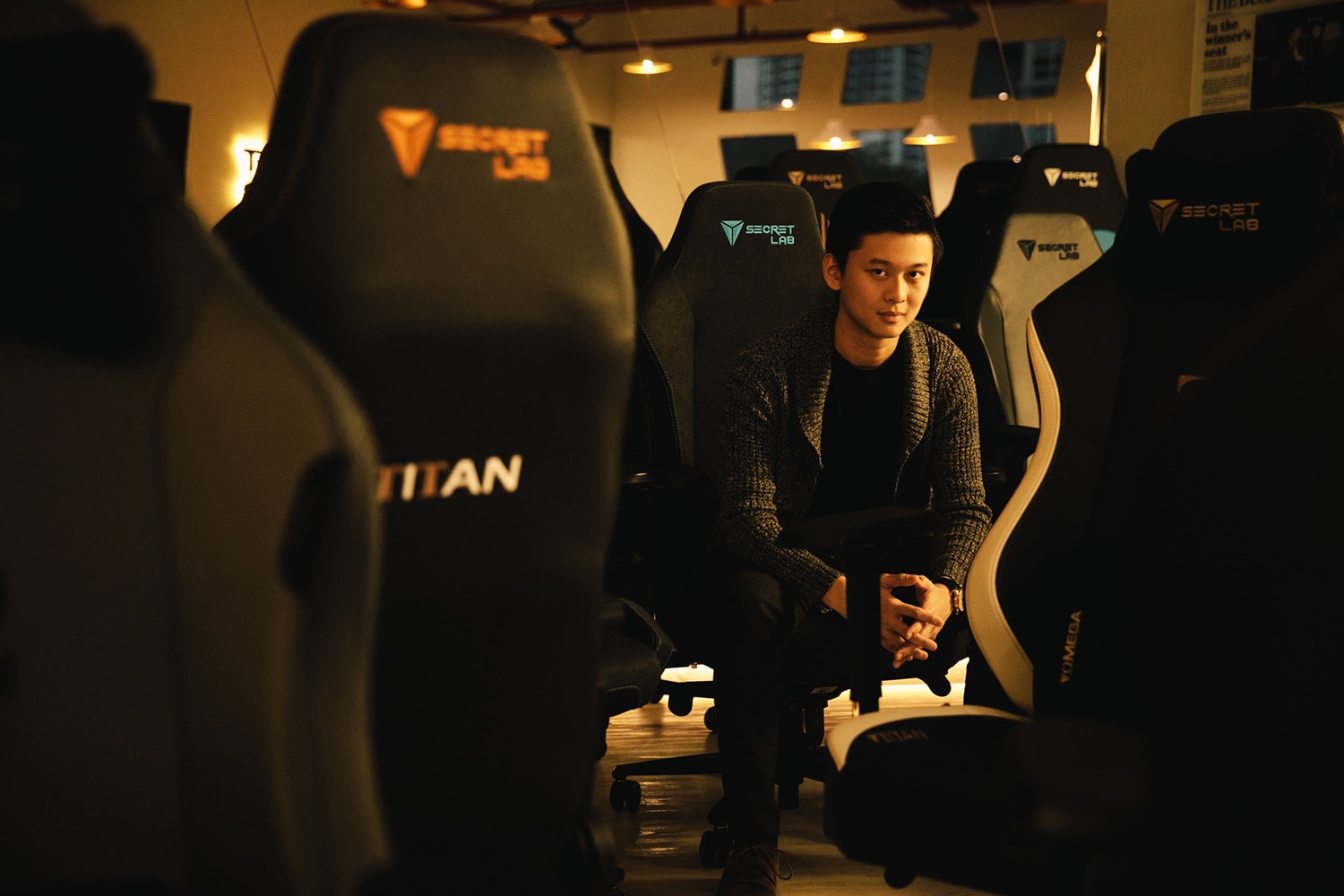
The signature Secretlab chair is a Goliath. Stretching up to 143cm tall and 74cm wide, the Titan gaming chair is the largest of the three models from the Singapore brand’s latest 2020 series. Though appearing as sturdy and unwavering as a monolith, the ergonomic seat acts as a cocoon of sorts that engulfs its user, flexible enough to contort to each person’s preferences. For instance, a high backrest allows you to recline almost fully, while its “4D armrests” can be customised to suit your sitting position. Its creator, by comparison, looks like a David. Although, this entrepreneur is no boy with a slingshot. Ian Alexander Ang is a 27-year-old gaming enthusiast with an internationally-recognised company. The co-founder and CEO of Secretlab has already ascended to the throne of his kingdom, alongside his founding partner, Alaric Choo. An overnight sensation that sold out and broke even as a month-old company in 2014, Secretlab has only gotten better, with its biggest market in the US (including a cult following in Canada, Europe, the UK, and the region). This meteoric rise has prompted Heliconia Capital to take a stake in the company, which is now valued at an estimated S$200 to S$300 million. Ian doesn’t call himself a king, however. Just like how Secretlab’s chair is designed to take on a more supportive role instead of being the main character, Ian serves as the Protector of the Realm at the company—a tongue-in-cheek, Game of Thrones-inspired title that has been etched onto the glass window of his office. For him, the business always comes first. “If there’s someone else who’s more appropriate in terms of running the company, I’ll definitely step aside and let them run it. There’s no ego involved in this. We just want the best for the company,” he says earnestly. He looks out for his staff, keeping the environment non-hierarchical and himself, approachable. In this realm, there is no single Iron Throne to jostle over. Everyone gets to sit on those colossal chairs that are a lot more comfortable than one made out of 1,000 swords. New employees receive a company jacket and a Secretlab chair of their choice to keep at home as well. “Don’t make me look too young,” Ian tells the photographer, as he prepares for the next shot. Beneath his confident facade, I sense self-doubt and insecurity surrounding his age, as if he has been defined by it. Whether this ageism works for or against him, there's no denying that this wunderkind university dropout has put Singapore on the map, just like their gaming counterpart Razer.
ANGELA LOW: What’s the story behind the name, Secretlab?
IAN ALEXANDER ANG: We went through quite a few names and actually spent more time than intended on it. Our thought process was that “secret” is one of the most alluring words in the English dictionary. People are drawn towards anything secretive. Alaric and I are also very product-focused people. We love putting things together and doing R&D, so we thought the word, “lab”, would give that sense of spending a lot of time in the laboratory.
ANGELA: What's the dynamic like between you and Alaric?
IAN: These days, he's mostly in charge of PR, partnerships and product development. I handle most of the rest—marketing, operations, finance, etc, but we still work together daily on product strategy and our choice of partners. Alaric's like a brother to me. We hang out all the time on weekends with our friends, and we get along really well. It's something I'm really grateful for because you hear stories of company founders having issues all the time. Although it's extremely normal because you're spending 12 hours a day with them. It’s one step beyond a normal relationship.
ANGELA: Have you ever fought?
IAN: Of course. We've had uncomfortable conversations about the company, about shares, especially in the first few months. I think that's what really breaks a lot of companies apart… things like who's going to take credit for this, who has the power... we don't really care about these things. We’re both pretty objective, and we usually agree on what's fair.
ANGELA: What was it like in the beginning?
IAN: It was mostly me and him, although we did get outside help especially when it came to the industrial design and engineering aspects. The first chair we did was hand-sketched. I’m definitely not the artsy kind. I’m very bad at drawing. I’m more of a science and math person. But I had an idea and I did a rough sketch. Alaric had to draw a more accurate one. He’s a pretty good sketcher. Thereafter, we gave it to the designers to put it in 3D.
ANGELA: What was the first prototype like?
IAN: Compared to our chairs now, there’s a huge difference. It’s like the original iPhone vs iPhone X. We’ve changed or improved almost every part of the chair in one way or another. A chair isn’t like a phone. You can’t say, “It has this feature. It’s two times faster.” Rather, it’s the whole experience of the chair. When you sit on it, do you feel comfortable? How does it look? It’s hard to describe and put a finger on it, but that’s our job to figure out.
ANGELA: How many iterations did you go through before getting to the final one?
IAN: I'd say a minimum of 20. These days, when we prepare for a new series, it takes a lot more than that. I can't even begin to count. We go through the ideation phase and the refining phase. Everyone will be quite jaded at the end of it.
ANGELA: What's the difference between Secretlab’s gaming chairs and the average ergonomic chairs?
IAN: I think that the most important function of a chair is to provide comfort for its user. There isn't a technical difference between our chairs and ergonomic chairs, but our chairs are upholstered, so there’s a lot more presence to it. You can tell immediately when you’re looking at a Secretlab chair.
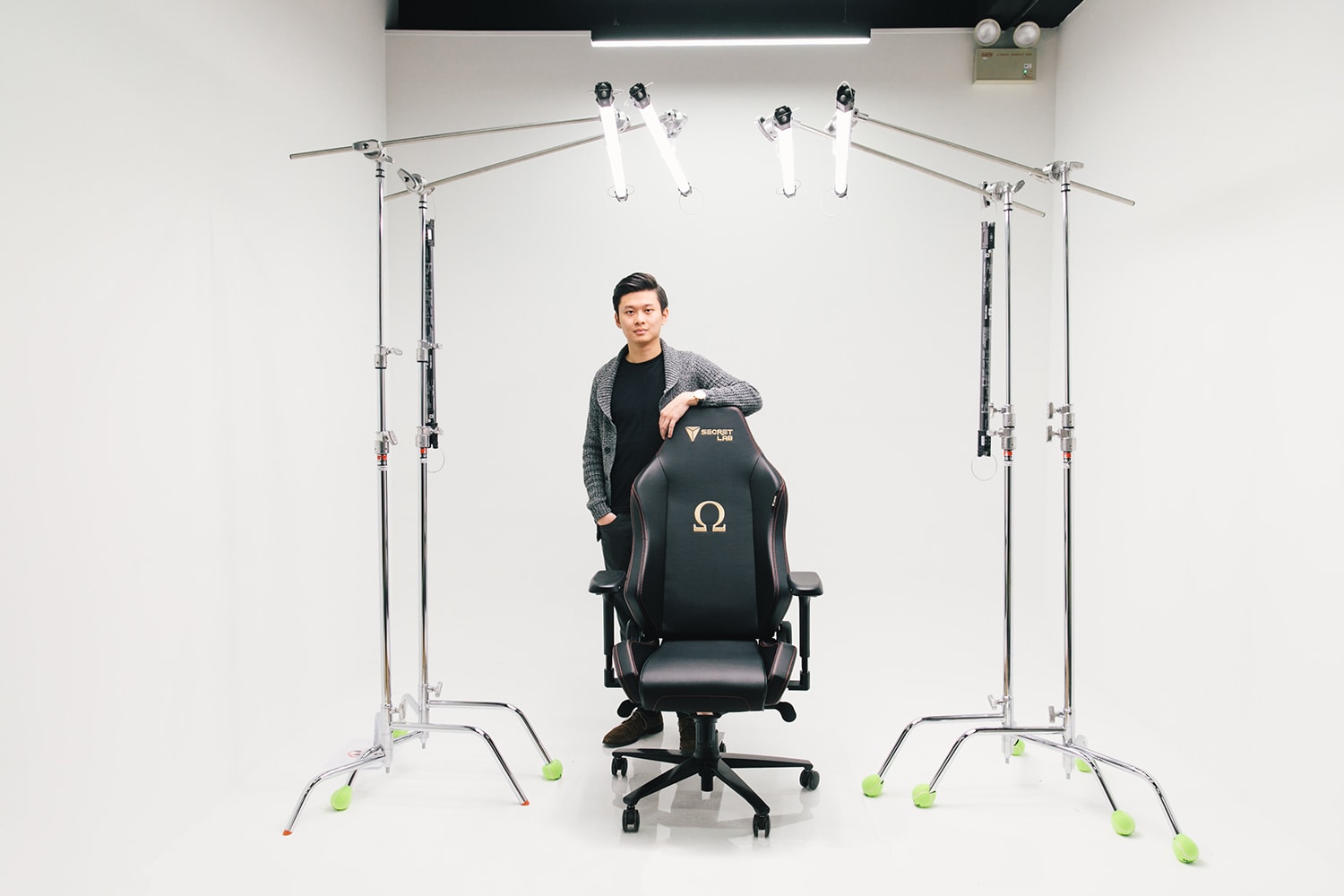
ANGELA: How do you constantly stay ahead of the curve, especially when creating new products or new versions of your current line of chairs?
IAN: The good thing is, Alaric and I are still huge gamers, and we talk to a lot of gamers, including the professional ones. You have to be very critical of how things are, even though it might be a bit unhealthy. Things like, when I’m gaming and sitting on a chair, does the armrest slide under the table well enough? Maybe if you sit on a chair for a long time without air-con, it’ll get hot. Can we do anything about that? I notice things like that a lot, because the small things add up. Our product team also has weekly meetings, where we'll explore ideas.
ANGELA: How often do you game now?
IAN: It depends. If there's a new release for a game, I might spend the entire weekend gaming. For example, for the past two weeks, I haven't touched it. But two weeks before that, my close friends and I had a LAN party. We brought our PCs down to my house and they stayed over for three nights. We gamed the whole weekend. It's quite cyclical.
"Some people get addicted, but personally, I’ve learnt a lot from gaming. My analytical skills came mostly from gaming, as well as my interpersonal skills."
ANGELA: Now that you're in the business, do you view gaming differently?
IAN: To be honest, the gaming and esports industry has really exploded over the past few years. Minister Chan Chun Sing even talked about it in parliament. We're lucky because we managed to ride the wave a little. Overall, I think gaming has its pros and cons. Some people get addicted, but personally, I’ve learnt a lot from gaming. My analytical skills came mostly from gaming, as well as my interpersonal skills. For example, in World of Warcraft, how it works is that I’ll be the founder of a guild or clan. Alaric’s usually playing as one of the officers too. Since I want to focus on the game, I’ll hire someone else to lead the clan and I’ll step down as an officer. It teaches you about team dynamics, and how to structure a clan or company in a way that’s the most efficient and everyone is happy.
ANGELA: When you were playing, were you aware that you were learning all these things?
IAN: No, it was 100% in hindsight. You know the Steve Jobs speech where he said you can’t connect the dots looking forward; you can only connect them looking backwards? It's extremely true. When I was 13 or 14, I was playing MMOs (massively multiplayer online games). In each game, everyone has an avatar and there’s a real economy as well. You get to trade stuff with other people. You learn about supply and demand, how to negotiate with people when trading, and how the production line works, where it's better if one person specifically does one task in the supply chain. Ordinary 14-year-olds won’t get to touch stuff like that in school.
ANGELA: Are you planning to diversify your product range? I know you’ve got accessories and shirts, but would you do a portable seat, for example?
IAN: After we’ve had a bit of success with Secretlab, people started asking us what our next product was going to be. Because how many people can you sell a chair to, right? We weren’t absolutely sure either, but we knew we had a winning product, so we wanted to realise its potential first before looking at another product. That’s why we started expanding overseas. In two years, we made our chairs available in over 50 countries. A chair is a bulky item. It’s not so simple in the back-end. The logistics have to be perfect. We’re not ruling any new products out for now, but we feel like a lot more can still be done with our current line of products. It’s what we’re known for. There’s no need to cash in and start making another product line. We just want to get our existing product into as many hands as possible.
ANGELA: How many of your consumers are local, and how many are international?
IAN: Singapore makes up less than 5%. Right now, the US is our biggest market.
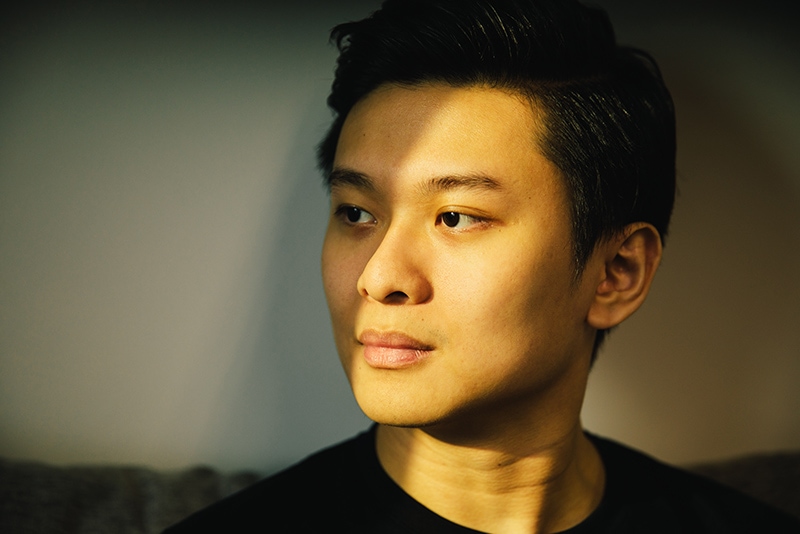
ANGELA: You also recently got funded by Heliconia Capital. Why did you decide to get external funding now?
IAN: It's quite an interesting juncture for us right now. How a typical start-up works these days is to raise funds first before finding success and establishing your company. For us, it was the opposite. We established ourselves first, then got an investor on board. We’d been having exploratory talks with investors for a while, but it wasn’t until I met Derek [Lau, the CEO of Heliconia] and his team that I felt these people could bring us to the next level. What I saw in them was that they’re great nurturers. They believe in letting the founders run the company, and stepping in to give corporate advice, and add value with connections wherever they can. On our end, our vision and day-to-day workflow won’t change as a result of that investment.
ANGELA: How are you planning to use the funds?
IAN: A lot will definitely go into R&D, with the goal to bring this winning product to more users around the world. That means physical and sales expansion.
ANGELA: Do you think it's harder to get to the top, or to stay on top?
IAN: I think they're pretty equal, but I'll go with staying on top. You know the saying, “Form is temporary, class is permanent”? I kind of agree with that. Sometimes, due to luck or whatnot, people get to the top. But those who stay there for a long time can’t just be lucky, because it is really difficult to maintain that position. No matter what, you also have to be competent to achieve great things.
ANGELA: That's true. And Secretlab was an instant success. It sold out within the first week, right? Was it a mad scramble?
IAN: Yeah, we were scrambling. [laughs] People like to ask me what's the toughest challenge I’ve faced, but I honestly cannot name one. There will always be new problems each week. You just get numb to it. Before we launched, because we were so green, we faced a lot of manufacturing hurdles. What we designed was what we had in mind, but whether it translates into a good chair is actually a lot more difficult than what people think. There are so many things to consider, and it’s not just the usability. Alaric and I discussed giving up a few times. But you just need to put all your mental energy into trying to solve it. If by the end of the day, you don't have an answer, get some sleep, come back the next day and hope that your outlook is more positive. We learnt that we need the mental fortitude to think very deeply, even though it may stress us out. The convenient way out is not to think about it or to make an easy decision.
"When we first started, I thought if this doesn’t work out, at least I would’ve made my dream gaming chair."
ANGELA: With all the success you’ve seen, did you ever think that it was too good to be true?
IAN: Oh, for sure. Honestly, I'm quite a pessimistic person, but I'm very grateful for the success we’ve had. Even though we've put in a lot of blood, sweat, and tears, and the growth was quite deliberate, luck definitely played a part as well. Even meeting Alaric, who has been quite a perfect co-founder... I'm aware that not many people will have these kinds of opportunities.
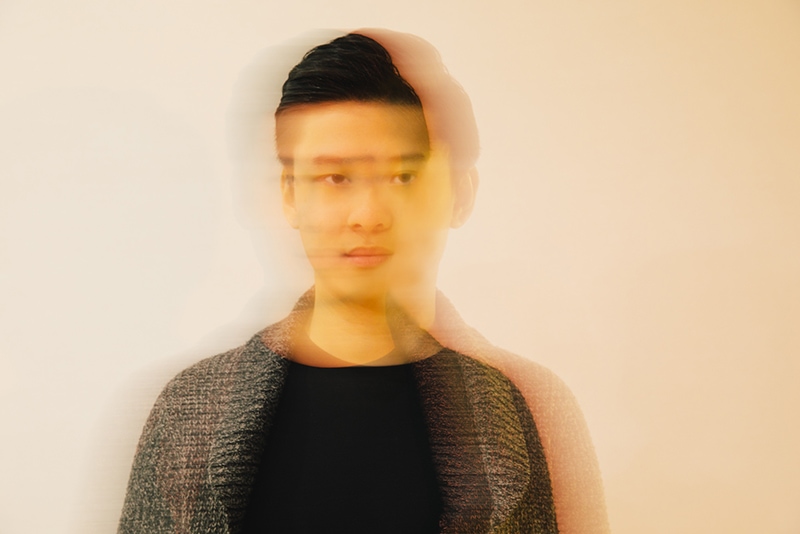
ANGELA: When was the last time you struggled with self-doubt?
IAN: All the time! [laughs] When we first started, I thought if this doesn’t work out, at least I would’ve made my dream gaming chair. Today, we have over 200,000 users, which is 200,000 more than what I’d expected. Sometimes I ask myself, “Can I even run a company this big?” But I always say, if there’s someone else who’s more appropriate in terms of running the company, I’ll definitely step aside and let them run it. There’s no ego involved in this. We just want the best for the company.
ANGELA: What’s your leadership style?
IAN: I don't want a job to be just a job. It's very important for people to have something to work towards, to feel like they're progressing as well. I don't really need to actively manage most of the people who report to me. They all know that the work they're doing contributes a lot to the company. This is something we pay attention to, and we make sure they're rewarded for it. I also try to extract the best out of every person by putting them out of their comfort zones, stretching them to their limits. Something that Derek told me that made a lot of sense is that there are different kinds of players. Let's say basketball or soccer. Some people want the ball all the time. They want to do a lot with it. But there are others who don't really want the ball and prefer to support instead. They can still be competent, but they don't really want to lead or manage a lot of people at a time. The third kind is the not-so-good kind—people who want the ball but they're not very good at the game. Look out for the first kind and make sure you really groom them and give them affirmations. For the second kind, you shouldn’t force them into leadership positions. They have to like the job for it to last in the long run.
ANGELA: What kind of relationship do you have with your staff? How casual is it?
IAN: Because we're mostly all the same age, it's really a lot easier to get along. Of course, we can't be too “buddy buddy” either. At times, you have to be more of a leader. If somebody's not doing a good job, we have to talk to them about it and put them on the right track. At the same time, if they're doing a good job, you have to tell them as well. This is not something that friends do to each other that much, right? [laughs] But because we're all about the same age, we’ll also game together and talk about the latest developments in tech.
ANGELA: Would you say that you prefer to work more on product development, or do you also enjoy managing people?
IAN: I much prefer it if I could just create amazing products and do the marketing part as well. Managing people is just part and parcel of the job. It's not my favourite, but it's a necessity to have a company that's running very smoothly.
"We have people who've been with us for two to three years, and they're drawing people with 10 to 15 years worth of salary."
ANGELA: Do you see yourself as a millennial leader of a millennial company?
IAN: Yeah, I think so. It's just a coincidence, actually. We don't have any prejudice against older people or anything. I guess it’s because we’re a digitally native brand, so the people we hire are going to be younger people who are more in touch with that. As millennials, we understand more about what millennials are thinking and the culture. For example, we have quarterly appraisals here. Because the company is moving so fast, I don't think the reward should be based on one end-of-year report. This serves a lot of good purposes. If the employee isn't doing well, the manager is forced to let the employee know. Also, millennials tend to want instant gratification. When you reward them quickly, you'll motivate them to contribute more, instead of just fulfilling the bare minimum. We have people who've been with us for two to three years, and they're drawing people with 10 to 15 years worth of salary. We pay them happily because they're doing a phenomenal job—that's the kind of opportunity I think more millennials wished they had.
ANGELA: I heard also that new employees have to take the Myers-Briggs test. Whose idea was it to implement this?
IAN: Probably mine. We're a very young and growing company, so it helps to learn about the different personality types and how to talk to them. I know not every ISTJ is going to be alike, but it helps to some extent, for the managers, to understand what the staff is like.
ANGELA: What other unconventional practices do you implement in your company?
IAN: I'm not sure if this is very unique, but we have flexible work arrangements. Our official working hours are 11am to 8pm. It’s quite weird, but the reason why we did this is because we wanted to avoid the peak-hour traffic. We also have to liaise with the US side as well, so sometimes employees have to stay till 9pm, which is 9am over in the US. For those with families and kids, they work from 9am to 6pm. In general, we're very flexible with our employees as long as they appreciate it and continue delivering for us. Around the time the last season of Game of Thrones was airing, we also released our Game of Thrones chair. Everybody was really into it. The episodes released at 9am, and the staff will watch it straight away. We booked the conference room and watched it together.
ANGELA: Is anyone else in your family also in business?
IAN: Oh yes, my parents own a few car workshops. It's a very traditional business and they've been at it for 30 years.
ANGELA: So it's in your blood?
IAN: I guess it's quite different. I see them working extremely hard, even though that's not necessarily a good thing. Why I say they're traditional is because of the way they work. It's still very micro. I don't want to be stuck in the same position. I want to be able to grow. I want to learn what’s the most efficient way to better the business. I did everything at the start—accounting, Photoshop, etc. [Looking at my parents’ business] is a good reminder not to be stuck doing the same thing—that's not what I want to do for the next 30 years.
ANGELA: Do you think that you’ll stay at Secretlab forever?
IAN: I was literally just thinking about this yesterday. I was sitting with my employees and thinking how long will they stay. The pioneer ones who’ve been with us for so many years probably won’t ever want to leave the company. For myself, I hadn't thought about it, and it's too far in the future to predict. I love half the job. The other half of the job is very challenging. It stresses you out, which isn’t good for my mental health. Still, I'd probably be doing this for a while.
ANGELA: What do you do to practise self-care?
IAN: I think sleeping is the best. [laughs] Sleeping is really the best cure. You can go to bed thinking it’s doomsday, but the next day, you wake up and it totally changes. Some things are definitely driven by certain chemicals in your head. That’s why it’s difficult to experience what a depressed person feels. You don’t have the same chemicals. For me, it’s just being more grateful from day to day. I enjoy playing the guitar too.
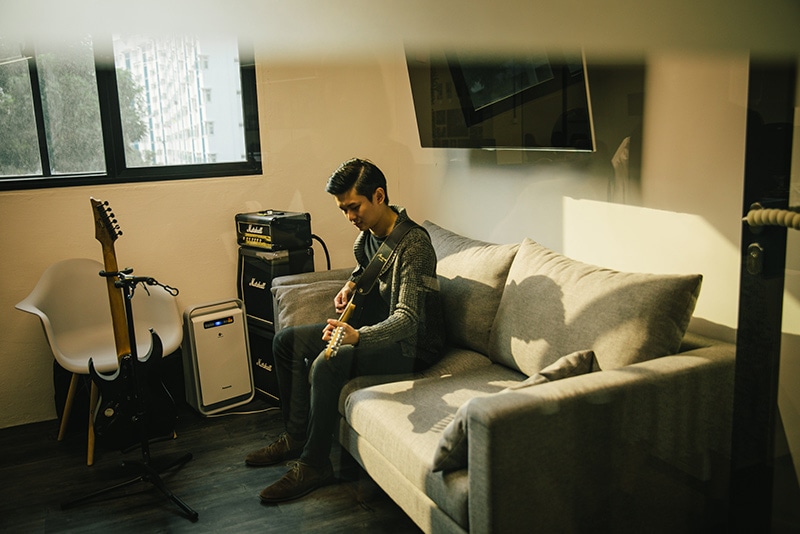
ANGELA: Do you meditate?
IAN: Yes, I do. It keeps your mind focused. My mind starts racing when I drink coffee, so when the crash comes, that’s when I’ll start meditating. I use apps like Calm and Breathe.
ANGELA: I read a report that said once a startup reaches 50 employees, they'll start to fall apart. As your company grows bigger, what sort of changes are you expecting and how are you adapting to them?
IAN: Wow, I don't know where you read that, but it's very accurate. Our growth has been insane. And I don't mean the number of users. I mean the bottom line and top line are growing really fast. Internal communications need to be changed quite a bit. Everything has to be formal. We're not going to be completely structured like an MNC. We still want the flexibility and agility of a startup. We always go with the 80-20 rule. Follow the rules 80% of the time, and work things out like a start-up 20% of the time.
ANGELA: What's your grand vision for Secretlab?
IAN: We started out as a gaming chair brand, but we’ve gone beyond the gaming scene already. Law offices, clinics and start-ups buy our chairs and use it, without us actively marketing to them. That's why I think the Secretlab chair isn't just meant for gamers. It's for anyone who sits at the computer for a long time. Our immediate vision is to have a Secretlab chair in front of every gamer. We want to be your undisputed number one choice, and we’ve achieved that in the past year. In the long term, I don't think we need to restrict ourselves to the gaming circle. People will start seeing the importance of buying, or investing in a chair because most people in developed economies have desk jobs. That's our end goal. We just want people to feel very comfortable when they're seated.

